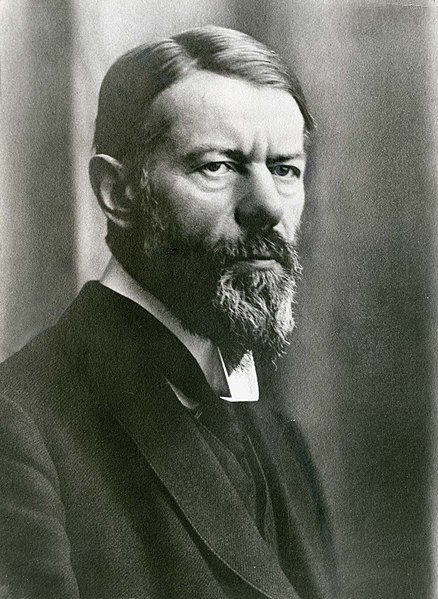Max Weber
“Man would not have attained the possible unless time and again he had reached out for the impossible. But to do that a man must be a leader, and not only a leader but a hero as well.”
Summary
- Weber was a German Sociologist
- He believed religion as the cause of social change and birth of capitalism
- Introduced theory of:
- Social Action
- Bureaucracy
- Authority
- Disagreed with Marx on social stratification

Introduction
- Max Weber (1864-1920) was a German sociologist and a contemporary of Durkheim.
- Weber raised an issue that remains controversial today: religion as the source of social change.
Religion and Capitalism
- Weber believed that preindustrial societies favored tradition over rationality whereas modern societies favor rationality over tradition. Weber viewed both the Industrial Revolution and the development of capitalism as evidence of modern rationality. By:
- Tradition, Weber meant values and beliefs passed from generation to generation.
- Rationality, Weber meant a way of thinking that emphasizes deliberate, matter-of-fact calculation of the most efficient way to accomplish a particular task.
- Weber also believed that religion causes social change. He theorized that:
- Roman Catholics hold on to traditions and believe they are on the road to heaven.
- Protestants focus on change and believe that they will be judged on the Judgement Day.
- Thus, the Protestants, started looking for ‘signs’ that they were in God’s will. If they were financially successful, then it was a blessing from God. It was a sign that God was pleased with them. They started to invest their money to make more money and as a result, brought about the birth of capitalism.
- Weber called this self-denying approach to life the Protestant ethic. He termed the desire to invest capital in order to make more money the spirit of capitalism. He believed capitalism was more likely to flourish in Protestant countries.
- Over time, this religious ethic become work ethic and the drive for personal wealth continued.
Theory of Social Action
- Weber introduced idea of social action and redefined sociology to be the study of social action. Social action is anything that affects society.
- Action is considered to be human behavior that has the purpose to convey some subjective meaning, this means that actions have a purpose which is called meaningful action.
- Meaningful action should be observed and measured by using the principles of statistics since there is uncertainty about the subjective meaning for the action.
- Human behavior is complex, difficult and impossible to measure using math and statistics. The same is true for motives of an action.
- The social action should take place in the presence of other individuals.
- He presented 4 types of social action:
- Purposeful Logical Action is carried out to achieve a certain well defined result and it depends on the ability of the actor. Different social situations may have different sources and purposes, However the actor is free to select any source based on his own capabilities.
- Value Oriented Action is something that has inherent or implied value associated with it. Like praying in religions.
- Affective Action involves emotions in the selection of the purpose and sources rather than raw capabilities. Such actions are very emotional in nature and are therefore mostly irrational and illogical. These actions are free from scientific observation and are a key part of cultural values of society.
- Traditional Action is according to customs and ceremonies of society. They don’t necessarily have any purpose decided by the actor, instead the action is performed simply as part of tradition. “This is the way”. These actions involve feelings and norms and are normally taught as part of family and educational institutions.
Theory of Authority
- Weber believed that organizations with more authority will have more influence in the society.
Presented 3 types of authority:
- Bureaucratic Authority is legal authority found in formal offices and depicted by the rank of the officer. The power of the officer is determined by the law that authorized him.
- Traditional Authority is found in beliefs, sacred norms and traditions. Priests, fathers or other religious figures are given authority as part of tradition.
- Charismatic Authority is the authority of an extraordinary person. Such authority is given to people who display wisdom, saintliness, knowledge, skill or charisma.
Theory of Bureaucracy
- According to Weber, bureaucracy is the best organization.
-
Weber stated that bureaucracy presented ideas on the structure of government and its offices. He defined it as a hierarchy. A rigid division of labor is established that clearly identifies regular tasks and duties of the particular bureaucratic system. Regulations describe firmly established chains of command and the duties and capacity to coerce others to comply. Hiring people with particular, certified qualifications supports regular and continuous execution of the assigned duties.
- Characteristics of a Bureaucracy:
- Specialized roles
- Recruitment based on merit (e.g., tested through open competition)
- Uniform principles of placement, promotion, and transfer in an administrative system
- Careerism with systematic salary structure
- Hierarchy, responsibility and accountability
- Subjection of official conduct to strict rules of discipline and control
- Supremacy of abstract rules
- Impersonal authority (e.g., office bearer does not bring the office with him)
- Political neutrality
Social Stratification
- Weber also formulated a three-component theory of stratification, with social class, social status and political party as conceptually distinct elements.
- The three-component theory of stratification is in contrast to Karl Marx simpler theory of social class that ties all social stratification to what people own (materialism).
- In Weber’s theory, issues of honor and prestige are important. The three components of Weber’s theory are:
- Social Class: based on economically determined relationship to the market (owner, renter, employee, etc.)
- Status: based on non-economic qualities like honor, prestige and religion
- Party: affiliations in the political domain
- All three dimensions have consequences for what Weber called “life chances” (opportunities to improve one’s life). Weber scholars maintain a sharp distinction between the terms status and class, even though, in casual use, people tend to use them interchangeably.
Criticism
- Some contemporary critics argue that Weber’s explanations are highly specific to the historical periods he analyzed. Some academics disagree, pointing out that, despite the fact that Weber did write in the early twentieth century, his ideas remain alive and relevant for understanding issues like politics, bureaucracy, and social stratification today.
- Many scholars, however, disagree with specific claims in Weber’s historical analysis. For example, the economist Joseph Schumpeter (1954) argued that capitalism did not begin with the Industrial Revolution but in 14th century Italy.
- It has been pointed out that the Netherlands, which had a Calvinist majority, industrialized much later in the 19th century than predominantly Catholic Belgium, which was one of the centers of the Industrial Revolution on the European mainland.
Bibliography
- The Protestant Ethic and Spirit of Capitalism
- Economy and Society
- Sociology of Religion
- Politics as a Vocation
- The Religion of China
- The Religion of India
- The Ancient Judaism
- The Emergence of Sociological Theories
